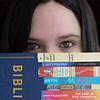You need to sign in or sign up before continuing.
Take a photo of a barcode or cover
informative
medium-paced
Interesting in places but very repetitive. Felt like it could have been half the length without losing anything.
Enjoyed the writing style despite the negative points.
Enjoyed the writing style despite the negative points.
Am I brainwashing my friends and family correctly? This book will tell you (and if you aren't it'll tell you how). Useful.
For a book titled "brainwashing," there is shockingly little content about brainwashing. The author delves into a number of pet topics, including politics, science, and neurology, but all in a scrambled blend that doesn't serve to make a coherent point.
Her arguments are poorly constructed, and I kept shaking my head at the number of times she would use *fictional* novels as evidence for a point about brainwashing. She also presumed shared politics with her reader, including comments such as "this presumption is as nonsensical as someone who opposes abortion but supports the death penalty"--it's out of left field for the point she's trying to make, and its introduction undermines rather than supports her argument.
I'm still trying to wrap my head around all the political content - is she arguing that politics is brainwashing? If not, why does she keep returning to politics throughout the book? Perhaps there's a reason, but she doesn't articulate it, and the book is ultimately choppy and incoherent. I made it halfway through and then gave up.
Her arguments are poorly constructed, and I kept shaking my head at the number of times she would use *fictional* novels as evidence for a point about brainwashing. She also presumed shared politics with her reader, including comments such as "this presumption is as nonsensical as someone who opposes abortion but supports the death penalty"--it's out of left field for the point she's trying to make, and its introduction undermines rather than supports her argument.
I'm still trying to wrap my head around all the political content - is she arguing that politics is brainwashing? If not, why does she keep returning to politics throughout the book? Perhaps there's a reason, but she doesn't articulate it, and the book is ultimately choppy and incoherent. I made it halfway through and then gave up.
I saw Michael Shermer recommend this book on Twitter and thought I’d check it out. This book from Kathleen Taylor is fantastic. I’m interested in this topic because words like “brainwashing” and “cult” are thrown around all willy nilly, but what does the science actually say? In this book, Kathleen Taylor breaks down the science as well as the psychology of what brainwashing is and what it isn’t. Taylor dives into the nuances of different research around neuroscience, psychology, personality studies, and much more. The book is extremely informational and educational, and by the end, you’ll not only have a better understanding of brainwashing, but you’ll also know how to improve your ability to think for yourself.
Although I highly recommend this book, I personally feel like it could have been a little bit shorter. I think a more condensed version of this book would help reach a wider audience, and this topic is extremely important during a time where people are denying science and believing whacky conspiracy theories. But, if you’re into really deep dive books, this book is for you.
Although I highly recommend this book, I personally feel like it could have been a little bit shorter. I think a more condensed version of this book would help reach a wider audience, and this topic is extremely important during a time where people are denying science and believing whacky conspiracy theories. But, if you’re into really deep dive books, this book is for you.
challenging
informative
slow-paced
challenging
informative
slow-paced
challenging
informative
slow-paced
We need to have things (and people) around us which are beyond our control, because their independence is the only way we have of making sure that we remain in touch with reality, of checking, as Wittgenstein says, that our thoughts and the words we use to shape them are still ‘right’.
Those ideologies (groups, individuals) which rely on ethereal ideas, and hence facilitate totalitarian thinking, are more dangerous than those which do not.
This evolutionary analogy led the biologist Richard Dawkins to introduce the notion of memetics, a ‘strong genetic’ metaphor for cultural transmission, which views ideas as ‘memes’ able to replicate themselves and be transmitted by imitation from brain to brain.
Given the sin of bias, it is no wonder that we feel we are the same from day to day. Our brains are constantly reshaping our memories to maximize exactly that conviction.
Do I contradict myself? Very well then I contradict myself. (I am large, I contain multitudes) - Whitman, Song of myself, lines 1325-7
Science-as-authority, worshipped without the moral restraint, self-knowledge, and humility which most religions are old and wise enought to demand (if not always receive) from their adherents, lets scientists off the Socratic hook of self-examination and allows them to treat their personal bigotries as accepted truths.
… when giving in to supposedly irresistable impulses we somehow ‘choose to lose’, to ignore or set aside the normal restraints, or to put ourelves in a position where we will be forced to lose control.
Talk of ‘brain areas involved in… ‘ is therefore a shorthand for ‘brain areas especially strongly activated in …’. It does not mean that other parts of the brain are not involved, only that our technology at present is not subtle enough to illuminate more than a fraction of the detail available.
… there is nothing particularly magical about the way the prefrontal cortex works. It does what other brain areas do, only more slowly and with better information, allowing our past experience to play more of a role in determining our current behaviour than would be possible with a less-developed prefrontal lobe.
The more alternative paths there are available for the flow of neural activity from input stimulus to ouput response, the weaker each individual synapse is likely to be. This is why age, education, creativity, and life experience, all of which enrich the cognitive landscape, tend to protect against influence techniques.
If you have neglected your neurons, failed to stimulate your synapses, obstinately resisted new experiences, or hammered your prefrontal cortex with drugs (including alcohol), lack of sleep, rollercoaster emotions, or chronic stress, you may well be susceptible to totalist charms of the next charismatic you meet.
The subject matter of this book is extremely fascinating, and the author is quite thorough in her multi-faceted approach, including insights from neuroscience, psychology, history, sociology, even literature. Unfortunately, the poor structure of the book doesn't quite put it all together. This is only made worse by the fact that the author doesn't ever define the word used for the book's title, so that any instance of mental manipulation could be included under a vague umbrella. I think the book would have been more effective if the focus was narrowed to examples of mass manipulation by force and stealth, which is likely what readers are looking for in a book entitled Brainwashing. A little humor and personality would have went a long way, too. In the end, this book is a champion for critical thinking, which is good because you'll need it to navigate the awkward order of information and the author's occasional condescension of ideas she disagrees with. Take it all with a grain of salt, and you just might enjoy this well-researched but disorganized book.
challenging
informative
medium-paced



